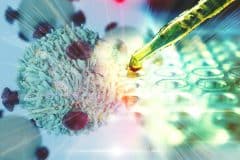Genomic medicine is changing the face of cancer treatment
Imagine a world where a single test could tip the scales in favor of a more effective treatment that fights a patient's specific cancer. That the doctor had information that allows him to adapt treatment to the genetic characteristics of the tumor, so that the treatment will be accompanied by fewer side effects with a better chance of treatment success. This is the direction the world is going

By: Harala Halevi. Content promoted in partnership with FoundationOne
We are at the dawn of a new era where cancer patients can receive treatment that is specifically tailored to their tumor. Personalized medicine, or targeted therapy "attacks the source of the tumor, so that a higher response rate can be achieved with fewer side effects, compared to chemotherapy." Says Dr. Abd Agbaria, director of the oncology unit at Bnei Zion Hospital.
For decades, doctors classified cancer according to the location or organ from which it started and treated patients with the same type of cancer - breast, lung, liver, or prostate - in a similar way. But the treatment plan was an educated guess, and many times the chemotherapy was not effective for a large number of patients. Thanks to the cracking of the human genome and the understanding that there are genetic differences between cancerous tumors, we now know that the difference in response to treatments lies in the biological change of each one, or in other words - the unique mutations that occurred in the DNA and led to the development of the specific tumor.

Dr. Abd Agbaria explains: "The fact that two people have lung cancer that originates from the same organ of origin does not necessarily mean that their biological, molecular characteristics are the same. In order to choose a more effective treatment for the patient's specific tumor, we must understand closely which tumor we are dealing with, that is, know what changes (mutations) have occurred in the genes of the cells from which a tumor develops."
The genomic profile guides the doctors
The idea in targeted therapy is to exploit the weak points of the tumor cells and destroy only the cancer cells (as opposed to chemotherapy or radiotherapy which are not only targeted at the tumor). For example, the weak points in lung cancer are the two genes - EGFR and ALK. Today there are biological treatments aimed at damaging these mutations. Cancer genetic tests are routinely performed as part of the disease diagnosis process, but because they are designed to test only a limited number of genes, these tests are not always sufficient.
They can indeed detect mutations in the EGFR and ALK genes, but since these mutations are found in only 15% of lung cancer patients, it is extremely important that the tests used to detect the same 2 mutations, be accurate and have a broad spectrum that makes it possible to find additional mutations, which is possible on by genomic testing. Dr. Agbaria explains: "A genomic profile test such as Foundation is a more sensitive test that scans the tumor and can diagnose over 300 genes and mutations related to cancer. For example, this test can find a wider variety of mutations that are amenable to treatment, such as BRAF, HER2, MSH2, and are found in 20% to 30% of lung cancer patients, and thus help us find a target-oriented treatment suitable for these mutations."
According to Dr. Agbaria, a genomic profile test can turn the treatment approach upside down. "Since we know that sometimes there is a genetic connection between cancerous tumors regardless of their location, the approach to the treatment plan needs to change and take into account the genomic profile. For example, a drug that is approved for the treatment of breast cancer may be useful in the treatment of lung cancer that has similar genetic mutations. When treatment is targeted and attacks the source of the tumor, a higher response rate is achieved with fewer side effects, compared to chemotherapy."

The future is already here
Already today, certain patients can undergo a test that scans the genomic profile and receive targeted treatment accordingly. Dr. Agbaria says: "A patient came to me in an advanced stage of lung cancer. He did not respond to the chemotherapy treatments, the tumor sent metastases everywhere in the body and it seemed that there was nothing left to do. The solution is found in a genomic test of the tumor that found specific mutations, which were not diagnosed by standard genetic tests. For these mutations there is a specific target-oriented treatment that has not been taken into account so far. After three doses of treatment, the patient began to respond, and less than two days later his condition began to improve and he was on his feet."
Personalized cancer medicine is the medicine of the future that is becoming a tangible reality day by day. As cancer research progresses we better understand how genes are responsible not only for the function of healthy cells, but also for the function of cancer cells. The ability to check the tumor's genomic profile equips doctors with new tools that allow them to target the treatment and adapt it to the patient's specific tumor. It allows the doctor to better predict how the tumor will respond to targeted therapies, such as biological therapies, sometimes even those that might not have been considered without the genomic information.
The article was written in collaboration with Roche, a representative of FoundationOne, and is offered to readers as marketing content
